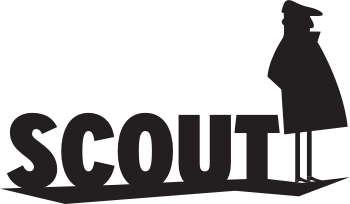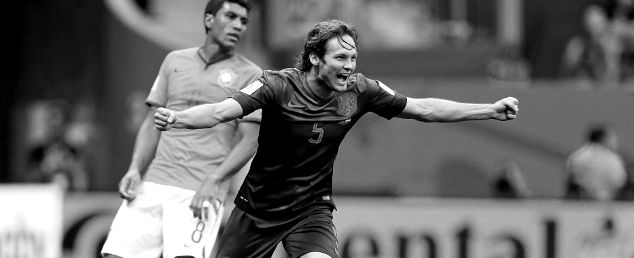Now that Brazil 2014 is finally over, we turn our attentions to preparing for the upcoming season. Whilst transfer rumours leave us speculating about potential assets and whose shirt they will be wearing, what (if anything) have the last few months taught us?
Is this the death of possession-based football?
Last season, fast, direct, attacking football became an adopted style for some of the most successful teams. Manchester City and Liverpool both achieved high league finishes by employing these aggressive tactics. Real Madrid similarly blitzed their opponents, with the speed of Ronaldo, Bale and Benzema in the Champions League. This was a major factor in their 4-0 victory against previous holders Bayern Munich in the semi-finals.
The trend continued throughout the World Cup, with pace on the attack being key to several victories, including a major tournament upset when Holland demolished previous winner Spain in the opening group stages 5-1. Germany sealed their place in the finals with a crushing 7-1 victory against hosts Brazil, using aggressive tactics to push forward, intercept and overwhelm the opponents defence before the Brazilians had a chance to recover.
So will this translate into the new season? With most teams playing their own style of football, the possession-based game appears to be in decline on many fronts. With the departure of Michael Laudrup from Swansea, we may have seen the end of teams relying on a heavy passing style to patiently break down their opponents. Perhaps we must look to acquire attacking assets that excel on the break.
Are attacking full-backs the next big thing?
Continuing the talk of tactics, it has been noted that full-backs have been an integral and often unnoticed cog in both the attack and defence for most national sides, something that perhaps has been overlooked for some time. The modern full-back is now required to be up and down the pitch more than ever before, as overlapping runs become crucial to getting the ball into goal-scoring areas. It is worth noting the amount of work this group of players have to accomplish for their teams to succeed, yet largely they go unrewarded in Fantasy terms.
Serge Aurier was a gem in an otherwise under performing Ivory Coast side, responsible for two assists early on in the campaign. Pablo Zabeleta and out-of-position Marcus Rojo performed their jobs with heart, aiding what turned out to be a resolute Argentinian defence, whilst still able to push up field. Ricardo Rodriguez was noted to be a player to watch in Brazil, and showed what he is capable of, duly serving up two assists and a clean sheet, only to be cruelly beaten by the Argentinians later on. Philipp Lahm, when moved to his natural position at right-back, tore apart opposing number Marcelo, and proved key to setting up three of his side’s seven goals in that match.
As teams continue to refine their formations and tactics post-World Cup, it may be worth keeping tabs on those full-backs that offer the ability to deliver at both ends of the pitch. Whilst 2013/14’s bonus points were skewed to favour centre-halves, many will be drawn to those that can turn defence into attack, and in reality, are playing as box-to-box wingers.
Midfield marshals are the most important players
Despite Messi claiming a hotly disputed Golden Ball award for the player of the tournament, many claimed that he was not even the best player in his team. Javier Mascherano proved why Barcelona need to play him in the middle of the park, as he finished the tournament as one of the highest for pass attempts, completion rates, and interceptions and was instrumental in his side’s progression to the final. Sami Khedira and Bastian Schweinsteiger were key to screening the German defence, responsible for everything from ball winning to key passes, and integral cogs to the German machine.
In essence, perhaps we should be eyeing up those teams that acquire excellent holding midfielders, knowing that their ability to command the pitch will harvest points for their teammates at both ends of the pitch, albeit few for themselves. Manchester City’s acquisition of Fernando suggests that they have better cover for Fernandinho, allowing Fantasy monster Yaya Toure to push further forward, whilst Arsenal’s potential target, Sami Khedira, will lead to some placing Aaron Ramsey’s forays forward, as well as the Gunners’ miserly defence, on their watch lists.
Van Gaal will use whoever he wants, wherever he wants
Many (including myself) foresaw the Dutch using their tried and tested 4-3-3, but an injury to Roma midfielder Kevin Strootman saw Van Gaal restructure his plans entirely. Rolling out the attacking 3-4-1-2 and similar variants showed that Van Gaal was not afraid to mix things up on the greatest stage. Substitutions played a key part in the Dutch reaching the Semi-finals, with Memphis Depay, Klaas Jan Huntelaar, and controversially, Tim Krul, all vindicating their manager’s decisions to change his options mid-game.
So what can we expect from the new Manchester United manager? His ongoing restructuring of the team means any new faces are more likely to be utilised than the underachieving old guard of last year. The likes of Luke Shaw and Ander Herrera may come onto our radars, whereas Fellaini, Mata, and even Rooney, may struggle to convince.
A key point of interest falls upon Robin van Persie. Captain and all-time top goalscorer for the Dutch, many have pencilled him in as the first name on their team sheets, but as shown in the hotly contested 2-1 win against Mexico, Van Gaal is not afraid to sacrifice his captain should things not go to plan – Huntelaar went on to assist the first goal, and score the winning penalty in the match. Whilst Van Persie is presumed to be first choice for Van Gaal’s new United, pre-season and time will dictate where, if at all, he will fit in.
Could impact substitutions become a more viable strategy?
Whilst substitutes are afforded limited time to change the course of the game, their ability to influence off the bench means the way in which managers intend to use them throughout the domestic campaign could be crucial. Marouane Fellaini earned a recall to the squad after his goal gave Belgium a win in the group stages, whilst others remained as ‘impact subs’, players designed to exploit the opponent’s fatigue. Memphis Depay managed two goals and an assist despite only starting one game, and Andre Schurrle cultivated three goals and an assist for himself, despite playing less than two games’ worth of minutes.
Some players, whether they like it or not, gain a reputation as a ‘super sub’ – Manchester United’s Javier Hernandez being a great example. Considering Chelsea’s growing midfield, it would not come as a surprise for Andre Schurrle to remain familiar to the substitutes bench, only to be called upon should Jose Mourinho deem it necessary. With the effectiveness of the substitute perhaps emphasised by the energy-sapping humidity of Brazil, it does lead us to question certain players’ game-time, or likeliness to arrive late in the game.




9 years, 9 months agoSmashing article.